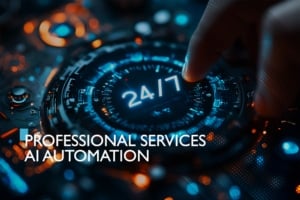Professional Services AI Automation
Delivers measurable ROI for legal, accounting, and consulting firms
Years in Business
Completed Projects
Professional services AI automation delivers measurable ROI within 90 days for legal, accounting, and consulting firms. Southeast Wisconsin businesses are witnessing unprecedented changes in professional service delivery as artificial intelligence reshapes entire industries. Milwaukee Web Design clients consistently report that firms implementing comprehensive automation strategies achieve remarkable operational improvements while positioning themselves for sustained competitive advantage in an increasingly digital marketplace.
The data speaks volumes about this transformation. According to recent McKinsey research, professional services firms using AI automation report cost reductions ranging from 22% to 37%, with leaders achieving the highest end of this spectrum through strategic implementation. This isn’t merely about efficiency gains; it’s about fundamentally reimagining how professional services operate in the modern economy.
For decision-makers evaluating automation investments, the window of opportunity is narrowing rapidly. Milwaukee professional services automation early adopters are already establishing market dominance while traditional firms struggle to compete on both efficiency and service quality.

Leading professional services firms are experiencing transformative results through strategic automation implementation. According to Boston Consulting Group’s 2024 research, organizations successfully deploying AI automation achieve average cost reductions of 22%, with top-performing firms realizing savings of up to 37% within the first year of implementation.
The scope of transformation extends across multiple operational areas. Legal AI automation focuses primarily on document review, contract analysis, and regulatory compliance monitoring, with 80% of professional services firms reporting active use of generative AI technologies for content creation and client communication enhancement.
Accounting automation AI demonstrates equally impressive results. Recent industry analysis reveals that 85% of accounting professionals identify increased speed and efficiency as the primary benefit of AI integration, while 68% report significant error reduction capabilities. The technology particularly excels in areas like invoice processing, financial reporting, and fraud detection, where pattern recognition capabilities provide substantial advantages over traditional manual processes.
Successful professional services AI automation requires careful strategic planning that balances immediate efficiency gains with long-term competitive positioning. Firms achieving the highest returns focus on systematic implementation rather than scattered pilot programs.
The most effective approach involves identifying high-impact use cases that deliver measurable results within 90 days. Generative engine optimization strategies complement automation efforts by ensuring firms maintain visibility in AI-powered search results as client discovery behaviors evolve.
Risk management emerges as the highest-ROI application area for professional services automation. Finance leaders implementing AI-powered fraud detection and compliance monitoring consistently report transformative business impact. These systems excel at analyzing massive datasets to identify anomalies and potential risks that human reviewers might miss.
Implementation success depends heavily on change management and stakeholder buy-in. Firms that invest adequately in training and communication see adoption rates 6 percentage points higher than those attempting purely technology-focused deployments. The human element remains critical, even as automation handles increasingly complex tasks.
Legal professionals face unique challenges that make AI automation particularly valuable for addressing time-intensive research, document review, and client communication requirements. Modern legal AI systems demonstrate remarkable capabilities in contract analysis, regulatory compliance, and case research.
Document review represents one of the most successful legal AI automation applications. Advanced systems can process thousands of legal documents in minutes, identifying relevant passages, potential conflicts, and compliance issues with accuracy rates often exceeding human performance. This capability proves especially valuable for litigation support and due diligence processes.
Contract analysis automation delivers substantial time savings for commercial law practices. AI systems can review complex agreements, flag non-standard clauses, and suggest modifications based on current legal precedents and firm preferences. Milwaukee legal automation solutions enable firms to handle higher case volumes while maintaining quality standards.
Regulatory compliance monitoring presents another high-value application. Legal AI systems continuously track regulatory changes, assess their impact on client matters, and generate alerts for necessary actions. This proactive approach helps firms avoid compliance issues while positioning them as valuable strategic advisors to their clients.
Accounting firms experience some of the most dramatic transformations through AI automation, particularly in areas involving repetitive data processing, error detection, and financial analysis. The technology addresses longstanding industry challenges including staff shortages and increasing client expectations for real-time financial insights.
Invoice processing automation represents a foundational application with immediate ROI potential. Modern systems can extract data from various document formats, validate against purchase orders and contracts, and route for approval automatically. This capability reduces processing time by up to 70% while virtually eliminating data entry errors.
Financial reporting automation enables accounting firms to provide clients with more frequent, accurate, and insightful reports. AI systems can consolidate data from multiple sources, apply appropriate accounting standards, and generate customized reports tailored to specific stakeholder needs. Wisconsin businesses implementing AI automation consistently report improved decision-making capabilities based on enhanced financial visibility.
Fraud detection capabilities provide another compelling automation benefit. AI systems excel at identifying unusual transaction patterns, duplicate payments, and other anomalies that might indicate fraudulent activity. According to the Association of Certified Fraud Examiners, the use of AI in antifraud programs is expected to triple over the next two years as firms recognize its effectiveness.

Strategic analysis automation enables consulting firms to process vast amounts of market data, competitive intelligence, and industry trends rapidly. AI systems can identify patterns, correlations, and insights that inform strategic recommendations while reducing the time required for comprehensive market analysis.
Client reporting automation transforms how consulting firms document and communicate their findings. Advanced systems can generate executive summaries, detailed analyses, and customized presentations based on project data and predefined templates. This capability ensures consistency while freeing consultants to focus on high-value strategic thinking.
Project management automation streamlines consulting operations through intelligent resource allocation, timeline optimization, and risk assessment. Leading consulting firms report ROI improvements of 20% or more when implementing comprehensive automation strategies that integrate multiple operational areas.
The urgency for implementation continues to intensify as client expectations evolve. Consulting firms that delay automation adoption risk losing competitive positioning as clients increasingly expect data-driven insights delivered at digital speed. Early movers establish sustainable advantages through enhanced service delivery capabilities and operational efficiency.
Professional services firms face distinct challenges when implementing AI automation, particularly around data security, regulatory compliance, and change management. Understanding these obstacles and developing appropriate mitigation strategies proves essential for successful deployment.
Data security concerns rank among the top barriers to automation adoption. Professional services firms handle sensitive client information that requires robust protection throughout the automation process. Successful implementations incorporate enterprise-grade security measures, including encryption, access controls, and audit trails that meet or exceed industry standards.
Regulatory compliance presents another significant consideration, particularly for legal and accounting firms operating under strict professional standards. Automation systems must maintain transparency and auditability to satisfy regulatory requirements. Firms achieving the best results invest early in governance frameworks that address explainability and compliance documentation.
Change management emerges as perhaps the most critical success factor. Research indicates that 73% of finance executives identify multiple implementation barriers as critical challenges. Firms that address these concerns through comprehensive training, clear communication, and gradual rollout strategies see significantly higher adoption rates and better overall outcomes.
The time for action is now. With 80% of professional services firms expected to adopt AI automation by 2025, early movers gain substantial competitive advantages while late adopters face increasingly difficult market positioning challenges. Southeast Wisconsin firms that act decisively can establish market leadership positions that become increasingly difficult for competitors to challenge.
Professional services AI automation uses artificial intelligence technologies to automate routine tasks, analyze complex data, and enhance service delivery across legal, accounting, and consulting firms. It works by processing large volumes of information using machine learning algorithms, natural language processing, and predictive analytics to perform tasks that traditionally required manual effort while maintaining high accuracy standards.
According to recent research, 73% of Wisconsin businesses implementing AI automation see returns within 90 days, with professional services firms often achieving cost reductions of 22-37% within the first year. The timeline depends on implementation scope, change management effectiveness, and the specific use cases prioritized.
Key risks include data security concerns, regulatory compliance challenges, and potential resistance to change from staff. However, these risks can be effectively managed through proper security protocols, compliance frameworks, and comprehensive change management strategies. Firms that address these concerns proactively see significantly higher success rates.
Invoice processing, financial reporting, fraud detection, and compliance monitoring show the highest ROI potential. These areas involve repetitive data processing where AI excels, reducing errors by up to 70% while freeing staff for strategic analysis and client advisory services.
Consulting AI tools improve service delivery through faster data analysis, automated report generation, enhanced market research capabilities, and improved project management. These tools enable consultants to focus on strategic thinking while providing clients with more comprehensive, data-driven insights delivered at digital speed.
Milwaukee firms should evaluate their current processes, identify high-impact use cases, assess data readiness, plan for staff training, and establish governance frameworks. Starting with pilot programs in specific areas like document processing or financial reporting allows firms to build expertise before broader implementation.
Web services are more than just website creation. They involve strategically crafting an experience that engages users, builds credibility, and turns your target audience into loyal customers.
Marketing goes beyond promoting products—it’s about telling a powerful brand story that builds trust, nurtures community, and drives meaningful business growth.
Book your no-obligation strategy session today and receive a complimentary custom homepage design. Limited to just 5 spots per month—reserve yours before they’re gone.

